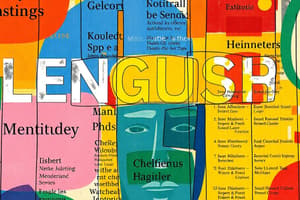Podcast
Questions and Answers
English is a part of the ______ branch of the Indo-European language family.
English is a part of the ______ branch of the Indo-European language family.
Germanic
The literary work 'Beowulf' is a key example from the ______ English period.
The literary work 'Beowulf' is a key example from the ______ English period.
Old
After the Norman Conquest, English experienced heavy ______ influence during the Middle English period.
After the Norman Conquest, English experienced heavy ______ influence during the Middle English period.
French
The Great ______ Shift significantly changed pronunciation in Early Modern English.
The Great ______ Shift significantly changed pronunciation in Early Modern English.
Modern English has seen extensive borrowing from various ______ due to globalization.
Modern English has seen extensive borrowing from various ______ due to globalization.
Parts of speech in English include nouns, verbs, adjectives, and ______.
Parts of speech in English include nouns, verbs, adjectives, and ______.
Important authors of English literature include William Shakespeare and ______ Austen.
Important authors of English literature include William Shakespeare and ______ Austen.
Different ______ of English vary based on regional influences, such as British and American English.
Different ______ of English vary based on regional influences, such as British and American English.
Flashcards are hidden until you start studying
Study Notes
Overview of the English Language
- Language Family: Germanic branch of the Indo-European language family.
- Global Status: Widely spoken as a first and second language; primary language in many countries.
Historical Development
-
Old English (450-1150 AD):
- Originated from Anglo-Saxon settlers.
- Influenced by Latin and Old Norse.
- Key works: "Beowulf."
-
Middle English (1150-1500 AD):
- Emerged after Norman Conquest.
- Heavy French influence.
- Key works: Chaucer's "The Canterbury Tales."
-
Early Modern English (1500-1700 AD):
- Great Vowel Shift altered pronunciation.
- Shakespeare and the King James Bible are notable contributions.
- Standardization of grammar and spelling began.
-
Modern English (1700-Present):
- Continued evolution with influence from technology and globalization.
- Extensive borrowing from other languages.
Grammar
- Parts of Speech: Nouns, verbs, adjectives, adverbs, pronouns, prepositions, conjunctions, interjections.
- Sentence Structure: Subject-Verb-Object (SVO) order.
- Tense and Aspect: Present, past, future; simple, continuous, perfect forms.
Pronunciation and Phonetics
- Phonemes: 44 standard phonemes (depending on accents).
- Stress and Intonation: Affects meaning and comprehension.
- Dialects: Variations exist due to regional influences (e.g., British, American, Australian).
Vocabulary
- Lexical Richness: Thousands of words, with extensive borrowing from Latin, Greek, French, etc.
- Evolving Language: New words develop, and existing words can change in meaning.
Literature
- Genres: Poetry, prose, drama.
- Notable Authors: William Shakespeare, Jane Austen, Mark Twain, Virginia Woolf.
- Contemporary Writers: J.K. Rowling, Chimamanda Ngozi Adichie, Salman Rushdie.
Usage and Variation
- Standard vs. Non-standard English: Different registers and dialects; variations in usage based on social context.
- Global Variants: British English, American English, Australian English, and more.
Key Concepts
- Linguistic Evolution: English continues to change and adapt, influenced by media, technology, and multiculturalism.
- Language in Society: Importance of English in education, business, and international communication.
Learning English
- Methods: Immersion, formal education, online resources, language exchange.
- Challenges: Irregular spelling, idiomatic expressions, and diverse accents.
Origin and Development
- English belongs to the Germanic branch of the Indo-European language family
- The language has a long and rich history, evolving through distinct stages: Old English, Middle English, Early Modern English, and Modern English
- Old English was influenced by Latin and Old Norse; notable work: "Beowulf"
- Middle English emerged after the Norman Conquest, heavily influenced by French; notable work: Chaucer's "The Canterbury Tales"
- Early Modern English saw the Great Vowel Shift altering pronunciation, standardization of grammar and spelling began, notable contributions: Shakespeare, King James Bible
- Modern English continues to evolve, influenced by globalization and technology; significant borrowing from other languages
Grammar and Structure
- English has a subject-verb-object (SVO) sentence structure
- Basic parts of speech include nouns, verbs, adjectives, adverbs, pronouns, prepositions, conjunctions, and interjections
- Tenses include present, past, and future; aspects include simple, continuous, and perfect forms
Pronunciation and Phonetics
- English uses around 44 standard phonemes, though this varies depending on accents
- Stress and intonation play a crucial role in meaning and comprehension
- Regional influences have led to various dialects, including British, American, and Australian English
Vocabulary
- English encompasses a vast lexical richness, with words borrowed from languages like Latin, Greek, and French
- The language is constantly evolving, with new words being coined and existing words changing meanings
Literature
- English literature spans genres like poetry, prose, and drama
- Notable authors include William Shakespeare, Jane Austen, Mark Twain, Virginia Woolf, and contemporary writers like J.K. Rowling, Chimamanda Ngozi Adichie, and Salman Rushdie
Usage and Variation
- Standard English is widely accepted, but non-standard dialects and registers exist, influenced by social context
- Global variants like British English, American English, and Australian English showcase regional differences
Key Concepts
- English continues to adapt and evolve, shapes by media technologies, and multiculturalism
- The language plays significant roles in education, business, and international communication
Learning English
- Methods include immersion, formal education, online resources, and language exchange
- Challenges include irregular spelling, idiomatic expressions, and diverse accents
Studying That Suits You
Use AI to generate personalized quizzes and flashcards to suit your learning preferences.




